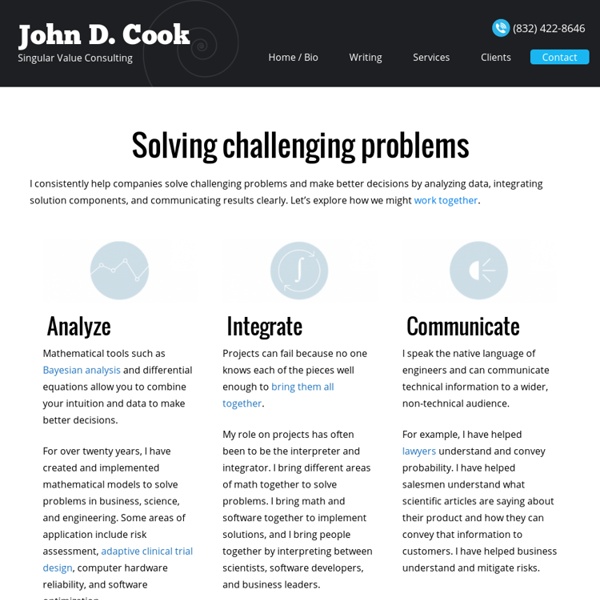The Endeavour
I help people make decisions in the face of uncertainty. Sounds interesting. I’m a data scientist. Not sure what that means, but it sounds cool. I study machine learning. I’m into big data. Even though each of these descriptions makes a different impression, they’re all essentially the same thing. There are distinctions. “Decision-making under uncertainty” emphasizes that you never have complete data, and yet you need to make decisions anyway. “Data science” stresses that there is more to the process of making inferences than what falls under the traditional heading of “statistics.” Despite the hype around the term data science, it’s growing on me. Machine learning, like decision theory, emphasizes the ultimate goal of doing something with data rather than creating an accurate model of the process that generates the data. “Big data” is a big can of worms. Bayesian statistics is much older than what is now sometimes called “classical” statistics.
The R programming language for programmers coming from other programming languages
IntroductionAssignment and underscoreVariable name gotchasVectorsSequencesTypesBoolean operatorsListsMatricesMissing values and NaNsCommentsFunctionsScopeMisc.Other resources Ukrainian translation Other languages: Powered by Translate Introduction I have written software professionally in perhaps a dozen programming languages, and the hardest language for me to learn has been R. R is more than a programming language. This document is a work in progress. Assignment and underscore The assignment operator in R is <- as in e <- m*c^2. It is also possible, though uncommon, to reverse the arrow and put the receiving variable on the right, as in m*c^2 -> e. It is sometimes possible to use = for assignment, though I don't understand when this is and is not allowed. However, when supplying default function arguments or calling functions with named arguments, you must use the = operator and cannot use the arrow. At some time in the past R, or its ancestor S, used underscore as assignment. Vectors Sequences
Bartosz Milewski's Programming Cafe
Impatient R
Translations français: Translated by Kate Bondareva. Serbo-Croatian: Translated by Jovana Milutinovich from Geeks Education. Preface This is a tutorial (previously known as “Some hints for the R beginner”) for beginning to learn the R programming language. You are probably impatient to learn R — most people are. This page has several sections, they can be put into the four categories: General, Objects, Actions, Help. General Introduction Blank screen syndrome Misconceptions because of a previous language Helpful computer environments R vocabulary Epilogue Objects Key objects Reading data into R Seeing objects Saving objects Magic functions, magic objects Some file types Packages Actions What happens at R startup Key actions Errors and such Graphics Vectorization Make mistakes on purpose Help Introduction I asked R users what their biggest stumbling blocks were in learning R. > search()
GigaSpaces
Matt Jaynes, Founder of DevOps University, wrote a great post on Hacker News, What is Continuous Deployment, in which he points out one of challenges that many people gloss over when they embark on their DevOps journey. In a nutshell, Matt was saying that, "You should get your house in order before aspiring to do automation or CD." In other words, if your testing is not fully automated or is taking too long to process, then having continuous deployment may not be right for you. The thing that gets me so interested in this entire DevOps movement is that it forces you to think holistically about software development, business cycles and organizational culture. With regards to Jaynes’ post, even if you can build a car faster, lack of proper QA may lead to shipping defective parts, and you will still be shipping slowly. In short, you need to get your house in order before launching continuous deployment right into production. What is an Application-Centric Approach to DevOps? 1. 2. 3.
Data Sorcery with Clojure
good coders code, great reuse
effbot.org
Related:
Related:



